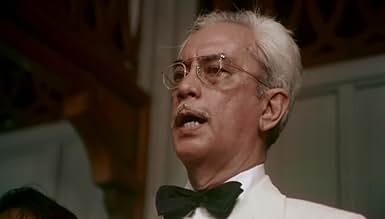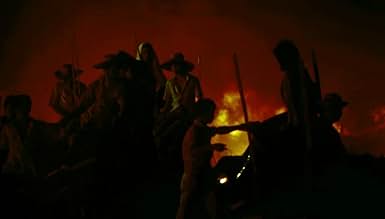Two affluent families struggle and learn to survive during the Japanese occupation in the Philippines.Two affluent families struggle and learn to survive during the Japanese occupation in the Philippines.Two affluent families struggle and learn to survive during the Japanese occupation in the Philippines.
- Awards
- 8 wins & 8 nominations total
Fides Cuyugan-Asensio
- Inday Lorenzo
- (as Fides Cuyugan-Asencio)
Mitch Valdez
- Jo Russell
- (as Maya Valdez)
Benjamin Delina
- Ponso
- (as Ben Deliña)
7.7734
1
2
3
4
5
6
7
8
9
10
Featured reviews
10dokvader
a masterpiece
Oro Plata Mata is not just a war film. It is a harrowing exploration of how quickly civility crumbles in the face of brutality. Set against the backdrop of the Japanese occupation of the Philippines during World War II, the film follows two wealthy families seeking refuge deep in the jungle, only to find that their gilded escape offer no true refuge from the chaos that is upon them. Instead of focusing on battles, Gallaga masterfully portrays the insidious erosion of the human condition.
The film is visually stunning, with great shots of the Philippine landscape. Gallaga uses symbolism effectively, particularly the recurring motif of the "oro, plata, mata" (gold, silver, death) game played by the families, which foreshadows their inevitable decline. While the narrative sometimes suffer from pacing issues, the performances are strong and compelling. The characters' development is deeply unsettling and shows the moral compass of each.
The movie avoids simplistic portrayals of black and white. Instead, it explores the complexities of collaboration and resistance, highlighting the moral ambiguities that arise in times of war. It's not merely a story about the horrors inflicted by the enemy but also about the internal conflicts and fracturing of relationships within a society under siege.
It is both a powerful and an unforgettable cinematic experience. Gallaga's film is a reminder of the devastating human cost of war, extending beyond weapons and skirmishes. It's a film that makes you think on the fragility of civilization and the fall of the human mind.
The film is visually stunning, with great shots of the Philippine landscape. Gallaga uses symbolism effectively, particularly the recurring motif of the "oro, plata, mata" (gold, silver, death) game played by the families, which foreshadows their inevitable decline. While the narrative sometimes suffer from pacing issues, the performances are strong and compelling. The characters' development is deeply unsettling and shows the moral compass of each.
The movie avoids simplistic portrayals of black and white. Instead, it explores the complexities of collaboration and resistance, highlighting the moral ambiguities that arise in times of war. It's not merely a story about the horrors inflicted by the enemy but also about the internal conflicts and fracturing of relationships within a society under siege.
It is both a powerful and an unforgettable cinematic experience. Gallaga's film is a reminder of the devastating human cost of war, extending beyond weapons and skirmishes. It's a film that makes you think on the fragility of civilization and the fall of the human mind.
WORK OF A MASTER- REST IN PEACE PEQUE GALLAGA
In honor of Peque Gallaga's life, I finally grabbed the chance to watch his masterpiece. Man, I am deeply ashamed that it took me this long to see it. This is in all ways the most complete Filipino film I ever had the privilege to witness. From the breathtaking photography, haunting music, and humanistic characters to impressive writing and radical directing, Oro, Plata, Mata has it all. Now, it all makes sense why this is widely celebrated and regarded as one of the greatest Filipino films ever. Let me add further that this is one of the best in the world! I was moved. No, knocked out of my seat how it had shown boldly the colorful heritage we have. Time and time again, we are reminded that the crucial enemies Filipinos face are ourselves. It's sad and enraging how it still rings true up to this time, more than 75 years after. All the collective trauma this nation faced are seem to be forgotten and pushed back inside us to give an illusion of victory. But have we learned? Did we move forward? Until we acknowledge our roots, study the past, demand accountability, and take control of our own history, Filipinos will just keep killing Filipinos. We will never rise truly.
Thank you Peque Gallaga for gifting us this Filipino treasure that I will now hold close to my heart. Safe to say, I already found what I have always been looking for in that little corner of our history. May you rest in peace.
Thank you Peque Gallaga for gifting us this Filipino treasure that I will now hold close to my heart. Safe to say, I already found what I have always been looking for in that little corner of our history. May you rest in peace.
One of the best Filipino films
I first watched this film in the 1980s when I was still in College and boy I was so impressed it left a lasting impression on me...40 yrs later I rewatched it in Netflix and it still has the same effect on me... this film is timeless and now considered a classic in Philippine cinema..so proud of this film and this immortalizes the director Peque Gallaga- may he rest in peace! Feeling nostalgic seeing the young Cherie Gil as Trining- one of the greatest actresses in Philippine cinema -she recently passed away and Im glad I got to watch her again in this film. Highly recommended to all millenials and younger generation of Filipinos to watch this -its a gem !
Oustanding Epos
Philippine Epos starting 1941 and ending after the Pacific War 1945, it shows the history of two aristocratic families during the invasion of Japan and and the resulting chaos that it provoked. Viewers will find influences, form Visconti, Coppola, Scorsese and others but uniquely is the depiction of sex and violence that is very natural and realistic therefore could be schocking for art-house fans. Story progress in an spiral form returning to the beginning but with some changes. Exceptional acting. It belongs to the drama Genre, but also sometimes is a war, love, comedy and horror Film- A must see.
Life During Wartime
One of the notable films in Philippine cinema, "Oro, Plata, Mata" (Gold, Silver, Death) is one of the epics of the silver screen immersive in breadth and scope. Set on the eve of the Japanese invasion of the Philippines during World War II the tale depicts two wealthy land owning families from the province whose affluent existences are turned upside down with the outbreak of war. From there it's an odyssey into the heart of darkness as social barriers break down and an endurance test of life-changing events ensue. Ace direction and good acting are further highlighted and complemented by the flawless editing and cinematography. If there's one flaw with the film it's the length. While watchable the movie would have had more of an impact in shorter form with the slow parts excised to heighten the best and gripping parts. Perhaps famed director Peque Gallaga's masterpiece and some of the best acting by the country's film luminaries, "Oro, Plata, Mata" is one of the most successful triumphs of art as life.
Did you know
- TriviaThe opening quote was written by Nick Joaquin. Peque Gallaga, the director told Jose Javier Reyes, the film's screenwriter, to create a frame reference for it and he cited a quote from the well-known writer.
- SoundtracksMignon: Act II, Polonaise
Written by Ambroise Thomas
Performed by Lily Pons, Soprano, with RCA Victor Symphony Orchestra (as Victor Symphony Orchestra)
RCA Victor
- How long is Oro, Plata, Mata?Powered by Alexa
Details
- Release date
- Country of origin
- Official site
- Languages
- Also known as
- Gold, Silver, Death
- Filming locations
- Production company
- See more company credits at IMDbPro
- Runtime
- 3h 14m(194 min)
- Sound mix
- Aspect ratio
- 1.33 : 1
Contribute to this page
Suggest an edit or add missing content




























